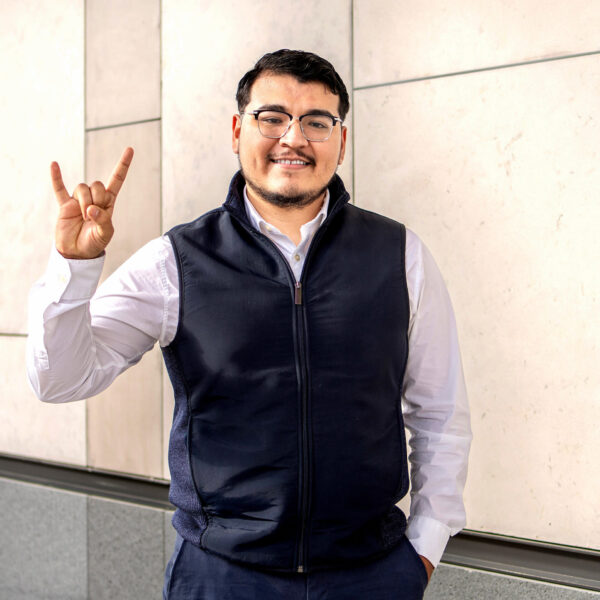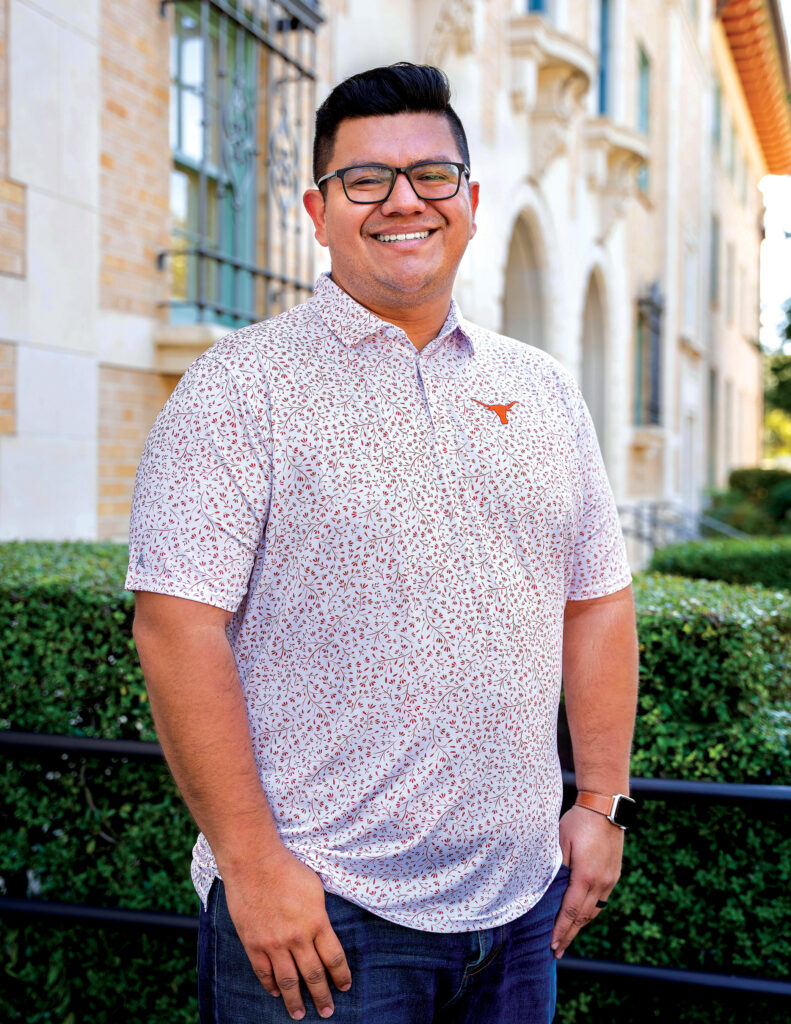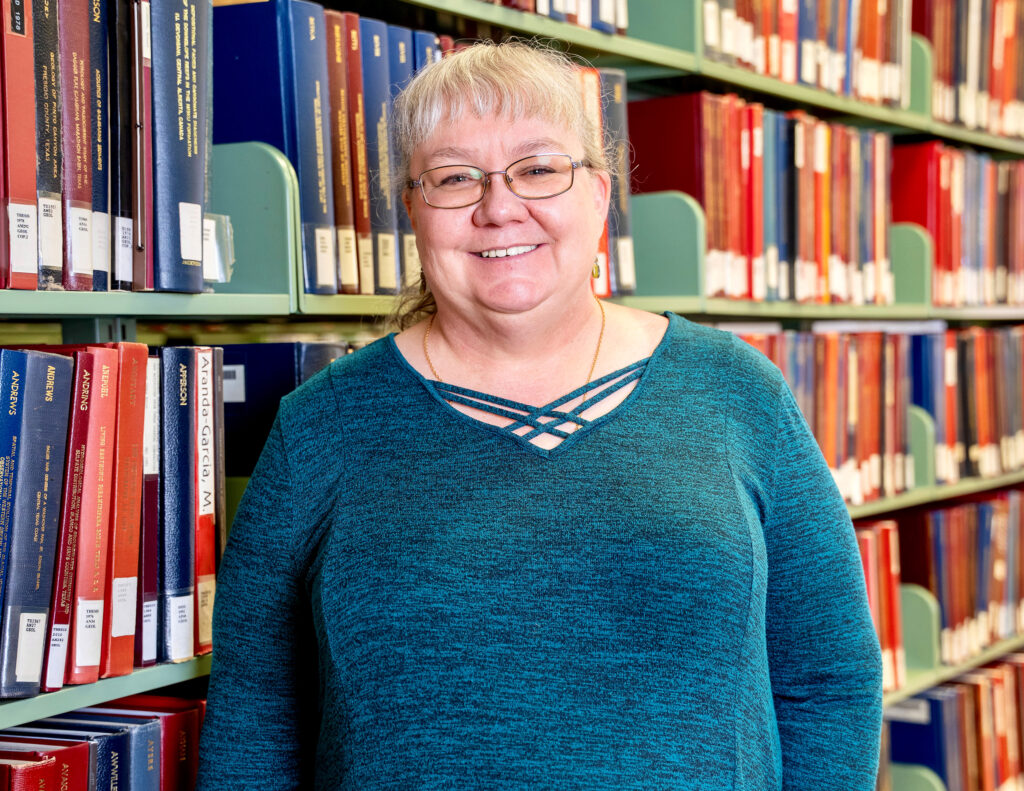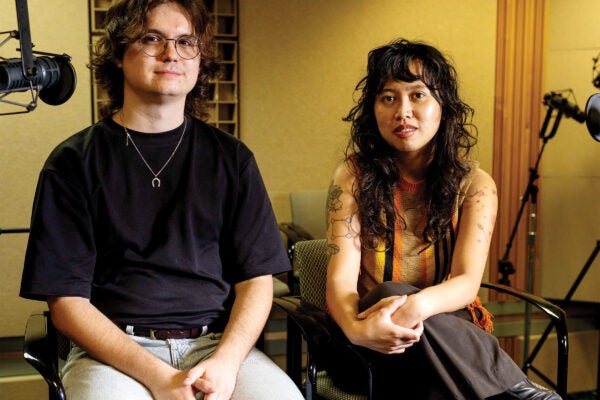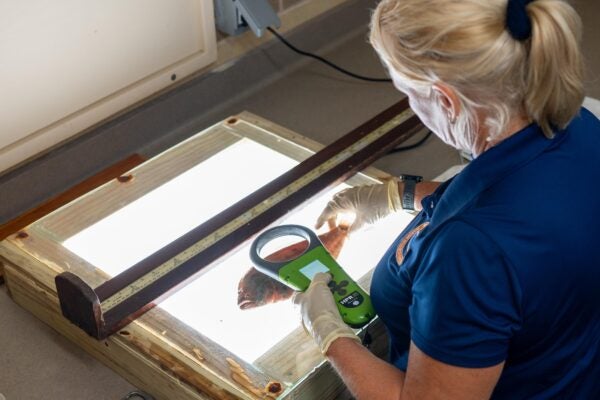The University of Texas has more than 14,500 full- and part-time staff members. But did you know that, as of February 2024, the University also had more than 13,000 undergraduate and graduate student workers? These student employees provide valuable services to the UT community, and some either keep working on campus after graduation or come back years later to continue their careers. In this issue, we talked with three staff members about their experiences as UT employees before and after graduation.
I wanted to once again be in an environment where education was important.
Mike Gutierrez
Gutierrez is a program manager in the College of Natural Sciences. While earning his bachelor’s (2013) at UT, Gutierrez worked several jobs on campus, including as a food handler, a FIG mentor, a peer academic adviser and a teaching assistant.
What are some things you experienced as a student that affect how you approach the job?
Learning how to work in an office setting for the first time and the expectations from different campus partners for student workers helped me build skills necessary to balance school and work. I was fortunate to have supervisors who always put school for me and my peers first and gave us flexibility for our work schedules and put us in positions to succeed. Also learning how to work with people across different generations was helpful to better understand how people of different ages view work in a certain office and how they approach different projects.
Was there a certain person you interacted with as a student who set you up for success as a professional?
I had several supervisors who were always helpful, caring, and had my professional development in mind with the different student jobs I worked. To name a few: Jay Brown, Kathy Uitvlugt, Cassandre Alvarado, Jay Whitehead, President Bill Powers, and Manuel Ramirez. I feel that interacting with all these faculty/staff from different departments during my time as an undergraduate student put me on the path I am on today and shaped the professional I am.
What are some of your favorite things about working at UT?
Having a sense of community and seeing the different cohorts of students develop each year. It’s been great to know some of the students I’ve worked with in other programs from their very first semester (sometimes even from summer orientation) and see them four years later as they celebrate during graduation. I also enjoy getting to meet people from different departments who work on similar programs and projects so that we can all collaborate and help support each other and students.
What have you learned since working here that you wish you would have known as a student?
There are some policies or procedures that as a student may have been frustrating because it seemed to take too long or didn’t move on at all, but now working as staff I understand what it takes to create change and implement new policies. Because there are still some systems that have been used from decades ago, I would tell my old student self that staff also share some of the same sentiments, and patience is important.
What advice would you give to staff or faculty members to help their student workers succeed?
As we continue to have more and more of a generational gap with students, it’s important to understand how new cohorts of students are approaching college and work in general. I would stress that having flexibility and putting their mental/physical health first is always going to take priority. I tend to keep things light with my student workers that I supervise and make sure to check in with them on how they are doing and share their highlights with me and their peers. Even having one thing that students can find positive between your interactions as faculty/staff will be helpful in the long run.
Elizabeth M. Korves
Korves is the fellowship program administrator in the Graduate School. While earning a degree in social work (1987), she worked in the Geology Library.
What are some of your favorite things about working at UT?
The people! I’ve had the blessing of working with some of the greatest people over my 30-plus years at UT. Currently I have one of the best jobs on campus because I get to administer fellowships for graduate students. I love the excited emails I get back when I send out award letters. I interact with staff all over campus, and they are some of the most dedicated people I’ve encountered when it comes to serving our students.
What have you learned since working here that you wish you would have known as a student?
Take advantage of any opportunity that is presented to learn something new, especially when it comes to computer programs. You never know when something you learned in one situation/job will be applicable in a different situation/job that will make doing that job easier.
Was there a certain person you interacted with as a student who set you up for success as a professional?
Dennis Trombatore, the librarian at the Geology Library. He trained me on some things which were not part of my job, in part because he was hoping to convince me to go to library school. When I needed a job while in graduate school and I applied for a student job at the Loyola University Chicago library, they took one look at my experience and created a new job for me. I could not have done graduate school without that job!
When did you realize that you wanted to work full time in a career at UT?
When I returned to Austin after several years in Chicago, I realized that I really wanted to return to UT for work. I wanted to once again be in an environment where education was important.
What are some things you experienced as a student that affect how you approach the job?
I had a supervisor who understood the importance of staff morale and that enjoying your work is just as important as how much money you are making.
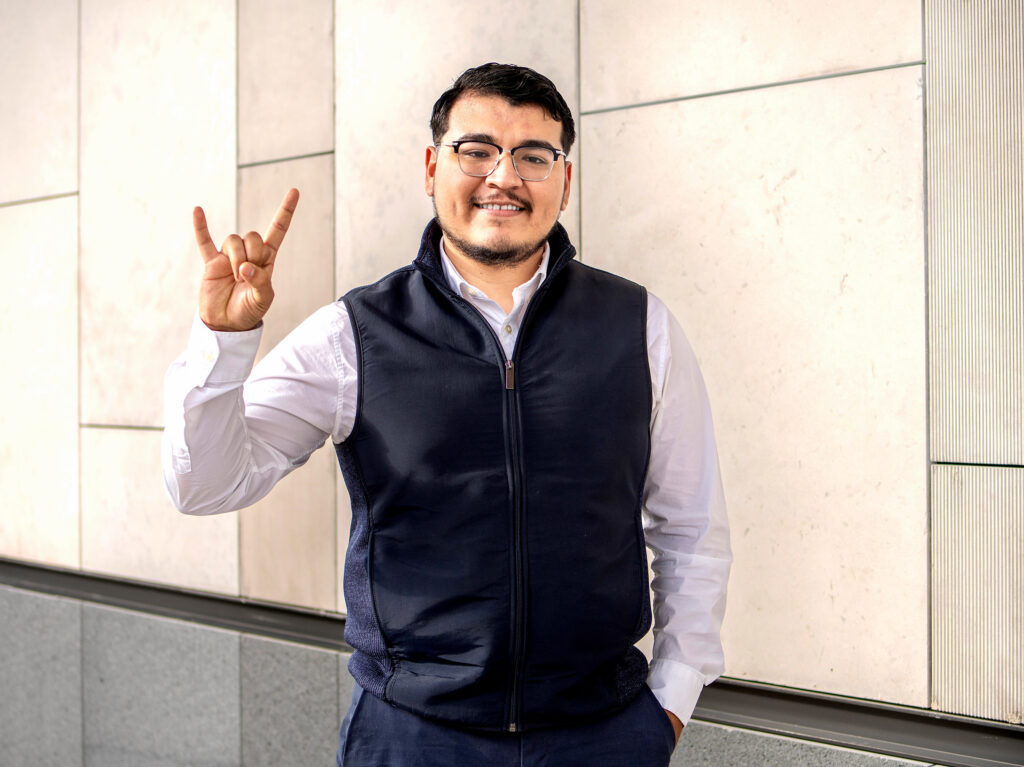
Rigoberto Mireles Jr.
Mireles is a benefits specialist for the department of Benefits & Leave Management. While earning a bachelor’s in corporate communication at UT (2020), Mireles worked as a research assistant for professor Su Yeong Kim on Project SEED and as a student worker for the Human Resource Service Center.
When did you realize that you wanted to work full time in a career at UT?
People often love the University of Texas at Austin for different reasons. Some may appreciate its strong academic programs, diverse student body, vibrant campus life, or the rich traditions associated with UT. The unique combination of these factors contributes to a sense of pride and connection which has led me to continue my professional career with the University.
What have you learned since working here that you wish you would have known as a student?
I wish my student self would have spent more time refining the balance I had between my work ethic and planning. In practice, the two are often intertwined. A solid work ethic allows you to execute your plans diligently, while effective planning ensures that your efforts are directed toward meaningful and achievable goals. It’s not a matter of one being more important than the other; rather, they complement each other for overall success.
A well-thought-out plan provides a roadmap, and a strong work ethic is the fuel that drives you along that path. Students should spend more time creating that professional roadmap so their energy can effectively be channeled towards their long-term goals.
What advice would you give to staff or faculty members to help their student workers succeed?
To support student workers’ success, staff and faculty members should consider assigning a mentor or provide opportunities for students to connect with experienced professionals who can offer them guidance and advice. They should try integrating student workers into the broader team. Inclusion fosters a sense of belonging that will motivate students to actively engage with their work. Lastly, a discussion should be had to explore the career aspirations of these students. Guidance can be provided on how their current role aligns with their future goals and offer insights into potential career paths. By implementing these practices, the University can create a supportive and empowering environment that enhances the success and growth of our student worker population.
